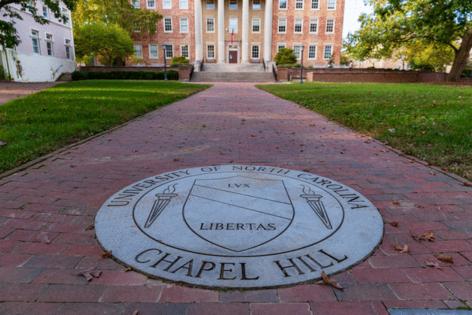Vaccine and COVID research, LGBTQ studies among NC projects hit by NIH cuts
Published in News & Features
Nearly two dozen grants and millions in research dollars have been canceled at UNC-Chapel Hill, Duke University and other North Carolina institutions as part of the growing list of projects cut by the National Institutes of Health.
Since February, the Trump administration has taken the unprecedented step of canceling hundreds of active research grants at many of the country’s top health and medical institutions.
The national list of cuts to NIH has grown to 638 canceled grants, including 20 at North Carolina colleges and institutions. Another 700 grants have been cut by the Centers for Disease Control and Prevention.
The cuts follow a pledge President Donald Trump made in a February memo called “Radical Transparency About Wasteful Spending."
“The American people have seen their tax dollars used to fund the passion projects of unelected bureaucrats rather than to advance the national interest,” Trump said in the memo.
Joining UNC-Chapel Hill and Duke among those impacted are UNC Charlotte, the North Carolina Department of Health and Human Services and the Research Triangle Institute.
The canceled grants largely focused on COVID-related research, gender, minority groups, climate research and overseas communities, topics the Trump administration has been critical of since returning to power. In all, the cuts total billions of dollars in federal funding for medical research.
UNC-Chapel Hill saw the highest number of grant cuts in the state, with funding canceled for 11 projects. Among those, funding dollars ranged from $40,441 for a study of addiction within the adolescent LGBTQ+ community, to $65 million for an effort to develop new oral antiviral drugs.
Each of the canceled grants at UNC-Chapel Hill focused on either COVID response, gender identity or minority topics.
The same was true for Duke’s canceled grants, with the largest, a $176 million project, studying the potential effectiveness of six different drugs on treating COVID. Included in that study was the effectiveness of Ivermectin against COVID-19.
Other Duke grants ranged from $116.6 million for COVID testing research and $28 million for general coronavirus vaccine development to $42,014 for a study of sexual health among of Black gay men.
To systematically end active awards is a departure for NIH, the world’s biggest public funder of biomedical research. In past years, the agency had canceled on average around 20 of its approximately 60,000 annual grants early for obvious fraud or potential harms.
“Terminating funding has previously been an uncommon action,” said Cat Long, research communications manager at UNC-Chapel Hill.
This past week, the Centers for Disease Control and Prevention announced it would be scaling back COVID-related funding, canceling more than $11 billion in funding to states.
In North Carolina, that means the Department of Health and Human Services will lose around $115.5 million in remaining funding. The department said this past week it anticipated cutting more than 80 jobs.
The funds were part of an $800 million package of COVID funding.
At RTI, two grants were canceled, totaling $250,000. One was intended to study the “Social influences on sexual health among Latinx adolescents and emerging adults who identify as LGBTQ+ in an agricultural community.”
The other canceled RTI grant aimed to improve health regulations in Nigeria.
Given North Carolina’s stature as a national leader in research and public health, funding cuts have hit hard. At RTI, which is also affected by cuts to the U.S. Agency for International Development, there have been two rounds of layoffs since Trump returned to office.
Combined, Duke and UNC-Chapel Hill accounted for more than half of the nearly $2 billion in NIH funding North Carolina received in 2024. Driven by these two Research Triangle institutions, North Carolina saw the sixth-most NIH dollars of any state, outpacing its population ranking (No. 9).
Beyond specific grant cuts, other changes at NIH mean universities can expect even less funding. The NIH has put a cap on “indirect grant payments” at 15%, funding that typically covers facility and administrative costs.
In anticipation of these funding cuts, Duke implemented a hiring freeze earlier this month.
_____
©2025 McClatchy Washington Bureau. Visit mcclatchydc.com. Distributed by Tribune Content Agency, LLC.







Comments